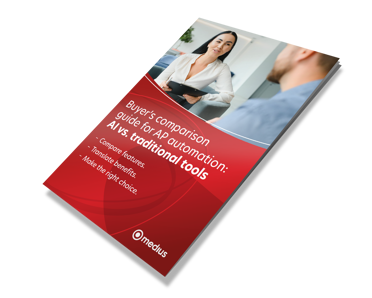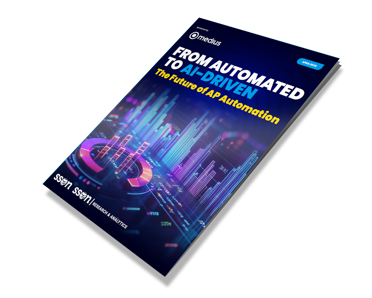The CFO’s guide to building a future-proof finance tech stack
- Introduction
- Why finance modernization is a strategic imperative
- Evaluating AP solutions? Don’t miss this checklist.
- Five must-have capabilities in a modern finance stack
- Why interoperability matters in finance transformation
- The role of AI and predictive insight
- Know the difference: AI-driven vs. “just automated”
- Proving the value of modern finance tools
- Why Medius belongs in the modern finance stack
Hear what's covered in this article:
CFOs are under increasing pressure to modernize finance operations without losing control. Regulatory demands, fraud threats, and tighter budgets are reshaping expectations across the office of finance. Meeting these challenges requires more than just adding tools. It demands a cohesive, future-ready tech stack that improves agility, strengthens compliance, and delivers actionable business intelligence.
To support this shift, finance teams need a clear approach to evaluating technology investments. The most effective stacks combine automation, analytics, and integration to create scalable systems that drive performance. Medius plays a central role in helping organizations achieve that vision.
Why finance modernization is a strategic imperative
Many finance systems still rely on fragmented processes, outdated reporting cycles, and high levels of manual work. These legacy approaches hinder the speed and reliability of decision making. As global finance becomes more complex, finance leaders must replace siloed infrastructure with integrated solutions that provide immediate, trusted data across the business.
Modernizing the finance stack is not just about efficiency. It is about empowering finance to act as a strategic driver, one that can respond quickly to change, adapt to shifting regulations, and support organizational planning with confidence. The right stack delivers not only faster processes but also stronger alignment between departments and better insight for leadership.
Evaluating AP solutions? Don’t miss this checklist.
All AP solutions claim to automate. But only some deliver real intelligence. Use this buyer’s guide to make sure you're choosing a platform built for today’s challenges.
Five must-have capabilities in a modern finance stack
Future-ready finance teams rely on platforms that work together to manage spend, mitigate risk, and increase agility. Below are five foundational components that every CFO should prioritize when evaluating and building a scalable finance tech stack.
AP Automation
Automating accounts payable is the foundation of a modern finance operation. Finance teams must process thousands of invoices accurately and quickly while maintaining compliance and visibility. A purpose-built AP automation platform reduces manual intervention, enforces policy controls, and offers end-to-end visibility across the invoice lifecycle. This not only eliminates bottlenecks but also provides a clear audit trail and real-time understanding of outstanding liabilities.
ERP integration
Disconnected systems drain resources and create errors. Seamless ERP integration ensures that AP, procurement, and finance systems all communicate using the same data. This improves reporting accuracy, eliminates duplication, and supports faster month-end close cycles. Medius offers prebuilt integrations with leading ERP platforms, enabling finance teams to maintain a single source of truth and streamline operational workflows from invoice intake to general ledger updates.
Real-time data
Finance teams need access to live financial data to monitor spend and identify risks. Static reports and delayed dashboards are no longer enough. With Medius, CFOs gain access to real-time data on invoices, approvals, and cash flow. These insights support faster reactions to changing circumstances and improve forecasting accuracy across departments. Visibility into what is happening now helps finance stay ahead of problems rather than catching them after the fact.
E-invoicing compliance
Staying ahead of international e-invoicing mandates is a growing concern for finance teams. As different regions implement unique digital tax and invoice reporting requirements, the need for scalable e-invoicing compliance becomes essential. Medius provides global compliance support with automated validations, regional rule sets, and up-to-date regulatory configurations. This allows organizations to stay compliant without burdening internal teams with manual tracking and policy updates.
Tariff planning
With global supply chains and international vendors, managing the full cost of goods is increasingly complex. Finance teams must consider taxes, tariffs, and shipping charges when budgeting or analyzing supplier performance. Medius supports smarter tariff planning by integrating these costs into the invoice process and surfacing them within reporting. This enables a clearer picture of true spend, helping leaders make better procurement and sourcing decisions.
Why interoperability matters in finance transformation
A finance tech stack cannot function in silos. Integration is not just a feature, it is a requirement for efficiency and accuracy. Systems must exchange data in real time, support automated workflows, and reduce the need for manual reconciliation. This creates consistency across business units and allows finance to operate as a strategic enabler rather than a reactive function.
Medius is designed for seamless integration. Its solutions connect directly with your existing platforms, including ERP, procurement, analytics, and compliance tools. This allows you to modernize incrementally while maintaining data integrity, operational control, and long-term scalability.

The role of AI and predictive insight
Artificial intelligence is no longer a future concept in finance. It is already delivering measurable benefits to teams that use it strategically. AI allows finance professionals to analyze large volumes of invoice data, identify spending patterns, and detect anomalies before they lead to problems. With predictive analytics, CFOs can anticipate cash flow gaps, vendor risks, or out-of-policy activity and take proactive steps to address them.
Medius builds AI into the core of its platform, enabling smarter decisions, more accurate forecasting, and faster response times. These capabilities allow finance teams to operate with greater confidence and precision in volatile or fast-moving environments.
Know the difference:
AI-driven vs. “just automated”
Not all automation is created equal. This report from renowned analysts SSON looks closer at how AI-powered AP drives results that traditional tools can’t touch: from cost to fraud prevention to compliance.
Proving the value of modern finance tools
Every investment in finance technology should deliver measurable outcomes. CFOs are increasingly expected to demonstrate short-term return and long-term scalability. Medius enables faster ROI by reducing invoice cycle times, increasing automation rates, and minimizing exceptions. Clients typically see a reduction in processing costs and improvements in team efficiency within months of deployment.
When you combine faster workflows with predictive insight and regulatory compliance, the value of a connected finance stack becomes even clearer. These tools not only improve day-to-day operations but also position finance as a stronger contributor to growth, planning, and cross-functional strategy.
Why Medius belongs in the modern finance stack
Medius offers more than just AP automation. It provides a full suite of solutions that support CFOs in building intelligent, scalable, and compliant finance operations. From invoice capture and global compliance to ERP integration and analytics, Medius brings together the critical elements of a modern finance stack in a single, unified platform.
Medius empowers finance leaders to reduce risk, simplify complexity, and stay in control through every stage of growth. Its modular design integrates with existing systems and scales as your organization evolves.
Book a demo today to see how Medius can help you build a smarter, more resilient finance tech stack that’s ready for whatever comes next.








